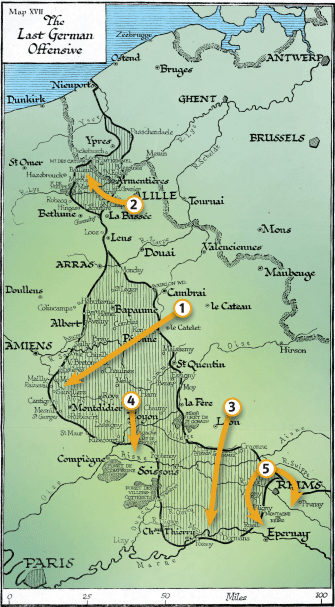The Ludendorff Offensive was a German offensive launched in March 1918, which was supposed to be the final offensive of the war in hopes that it would defeat the British Forces and drive France to seek armistice with Germany. However, this ultimately failed as Germany failed to capitalise on its gains during the start of this attack and was forced to retreat back and eventually surrender. The offensive holds historical significance due to its role in causing the downfall of Germany in World War One, as their loss and the following conditions caused by the numerous treaties they signed can be argued to have contributed to the outbreak of World War Two. However, this attack also holds significance as it credits the style of attrition warfare: Germany was unable to capitalise on its territorial gains at the beginning of the offensive due to its lack of resources and manpower, especially in the face of the United States who had joined the allies with much more resources and men. This threat of the US pushed them to attack, but it crumbled due to the overwhelming possession of resources on the opposing side and acts like Britain’s naval blockade which weakened the country over time. It did finally show that continuous attack on the enemy could be the way to victory, which was the concept upon which the nature of WW1 was founded.

Military map of the different parts of the Spring Offensive
Edith Cavill was a British nurse living in Belgium at the outbreak of World War I and, after the German occupation of Belgium, started sheltering British and other Allied soldiers before smuggling them through a network over to the neutral country of the Netherlands as well as transferring information. Eventually, German officials grew suspicious of her and, after uncovering what she had been doing, executed her by firing squad in 1915. Cavill is significant for her contribution to the resistance movement against Germany during World War I as she shows the way even normal citizens were dedicated to the war effort during the first months of the conflict. Her story is also important for its impact: after her execution, Britain used her story for anti-German propaganda in other Allied states and portrayed her as a martyr who died at the hands of the cruel and brutal German government.

Photo of Edith Cavill, photographer unknown
Cire,
I like that you used a battle and a form of resistance for this blog post, as it is somewhat similar to my approach. You have great analysis as to the significance of each event, but you could expand on this. An example of this for the Ludendorff Offensive would be to talk about the image that General Ludendorff had after this failed offensive. Knowing that American troops were soon to come, German civilians surely were aware of this failure and therefore possibly gave them a bad light on their government and those in charge of winning the war. Extra research would be needed for this. Otherwise, great post and great analysis of the impact of Edith Cavell’s execution.
– Tidiane D.
Hi Cire, I liked the way you explained, and showed the significance what happened during the Spring Offensive. Because it helped me understand what was going on, and how the Germans lost to the Allies.
Cire,
The two varied choices in this post show breadth of thought – keep it up. There were two points of historical significance raised for the Ludendorff Offensive, but neither was fully developed. This was an interesting choice to illustrate attrition in World War One since it was neither the longest nor least decisive of the Battles fought in the war. More analysis might have helped shed light on the thinking behind this particular choice.
Linking Cavill’s death to British anti-German propaganda is definitely relevant to historical significance, yet to convincingly explain significance, consider including more analysis and perhaps addressing a specific type of significance. I enjoy reading your writing and look forward to your next blog post.